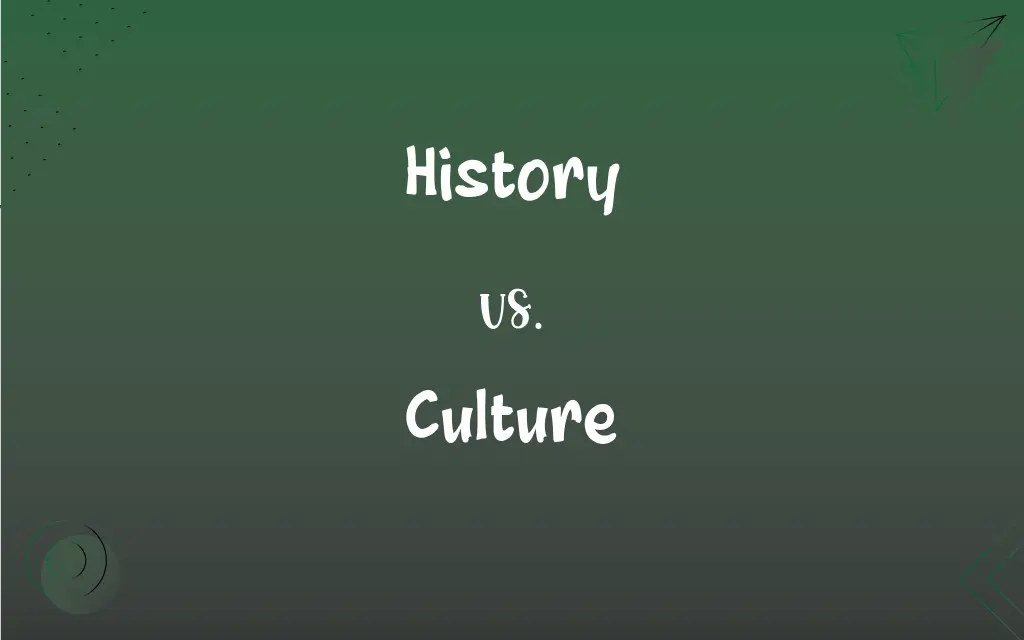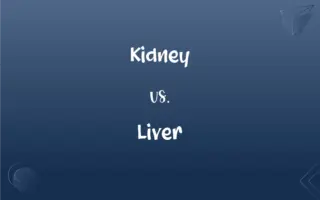History vs. Culture: What's the Difference?
Edited by Harlon Moss || By Janet White || Published on January 29, 2024
History is the study of past events; culture encompasses the ideas, customs, and social behaviors of a society.

Key Differences
History and culture are distinct yet interconnected concepts. History refers to the chronological record of past events and developments often associated with human societies, while culture embodies the ideas, beliefs, customs, arts, and social practices of a group or society.
History is focused on understanding and interpreting past events, such as wars, revolutions, and political changes. It provides a temporal perspective on how societies have evolved. In contrast, culture reflects the prevailing ideas, customs, and social behaviors of a community at any given time, shaping its identity and values.
History often involves analyzing documents, artifacts, and other sources to piece together the narrative of past societies. This study helps us understand how past events influence the present. Culture, on the other hand, is more about the expression of a society's way of life, including language, religion, cuisine, and art, representing the collective identity and values of a people.
History is recorded and studied to learn from past experiences and understand the trajectory of human development. Culture is dynamic, continuously evolving with societal changes, and is often passed down through generations, shaping individual and collective behaviors and attitudes.
History provides a chronological framework of past events, while culture offers insight into the daily life, beliefs, and practices of people within that historical context. Together, they offer a comprehensive understanding of human societies and their development.
ADVERTISEMENT
Comparison Chart
Focus
Past events and developments
Ideas, customs, and social practices
Nature
Chronological and analytical
Expressive and dynamic
Representation
Recorded events, documents
Arts, language, beliefs
Role
Understanding societal evolution
Defining identity and values
Transmission
Studied and recorded
Passed down and evolved
ADVERTISEMENT
History and Culture Definitions
History
The study of past events and their impact.
The history of the Roman Empire fascinates many scholars.
Culture
The ideas and behaviors that characterize a community.
Japanese culture places a high value on respect and honor.
History
The chronological documentation of the past.
History helps us understand the evolution of civilizations.
Culture
A way of life shared by a group of people.
The culture of the Maasai tribe is deeply rooted in their nomadic lifestyle.
History
A record of human activities over time.
History books often focus on significant political changes.
Culture
The collective customs, arts, and social institutions of a society.
Italian culture is renowned for its rich culinary traditions.
History
A narrative of societal and cultural changes.
History is filled with stories of human achievements and failures.
Culture
The artistic and intellectual achievements of a society.
Greek culture contributed significantly to Western philosophy and art.
History
An analysis of historical events and trends.
Studying history is essential for learning from past mistakes.
Culture
The social practices and norms of a group.
In Indian culture, family and community play a central role.
History
A chronological record of events, as of the life or development of a people or institution, often including an explanation of or commentary on those events
A history of the Vikings.
Culture
The arts, beliefs, customs, institutions, and other products of human work and thought considered as a unit, especially with regard to a particular time or social group
Edwardian culture.
Japanese culture.
History
A formal written account of related natural phenomena
A history of volcanoes.
Culture
These arts, beliefs, and other products considered with respect to a particular subject or mode of expression
Musical culture.
Oral culture.
FAQs
What is culture?
The collective ideas, customs, and social behaviors of a society.
How is history recorded?
Through documents, artifacts, and written accounts.
What is the importance of studying history?
To understand societal evolution and learn from past experiences.
Can history influence culture?
Yes, historical events often shape cultural development.
Can history be subjective?
Historical interpretations can vary, introducing subjectivity.
Can culture influence history?
Cultural elements can impact historical events and perspectives.
What is history?
The study of past events and their impact on societies.
How is culture expressed?
Through language, arts, rituals, and social practices.
Do historians study culture?
Historians often analyze cultural aspects to understand historical contexts.
What is the significance of culture?
It defines a society's identity and values.
Are history and culture static?
History is a fixed record, while culture is dynamic and evolving.
Is culture universally similar?
Cultures vary widely across different societies and regions.
How do historical events affect culture?
They can alter or reinforce cultural practices and beliefs.
How does culture impact individual identity?
It shapes personal values, beliefs, and behaviors.
What roles do cultural practitioners play?
They preserve, teach, and evolve cultural practices.
Can culture be preserved?
Yes, through conscious efforts in education and preservation.
How are history and culture taught?
History is taught as a chronological study, while culture through social studies and arts.
What roles do historians play?
Historians analyze, interpret, and record past events.
What sources do historians use?
Primary and secondary sources, including archives and testimonies.
How is culture transmitted?
Through traditions, language, and socialization.
About Author
Written by
Janet WhiteJanet White has been an esteemed writer and blogger for Difference Wiki. Holding a Master's degree in Science and Medical Journalism from the prestigious Boston University, she has consistently demonstrated her expertise and passion for her field. When she's not immersed in her work, Janet relishes her time exercising, delving into a good book, and cherishing moments with friends and family.
Edited by
Harlon MossHarlon is a seasoned quality moderator and accomplished content writer for Difference Wiki. An alumnus of the prestigious University of California, he earned his degree in Computer Science. Leveraging his academic background, Harlon brings a meticulous and informed perspective to his work, ensuring content accuracy and excellence.







































































